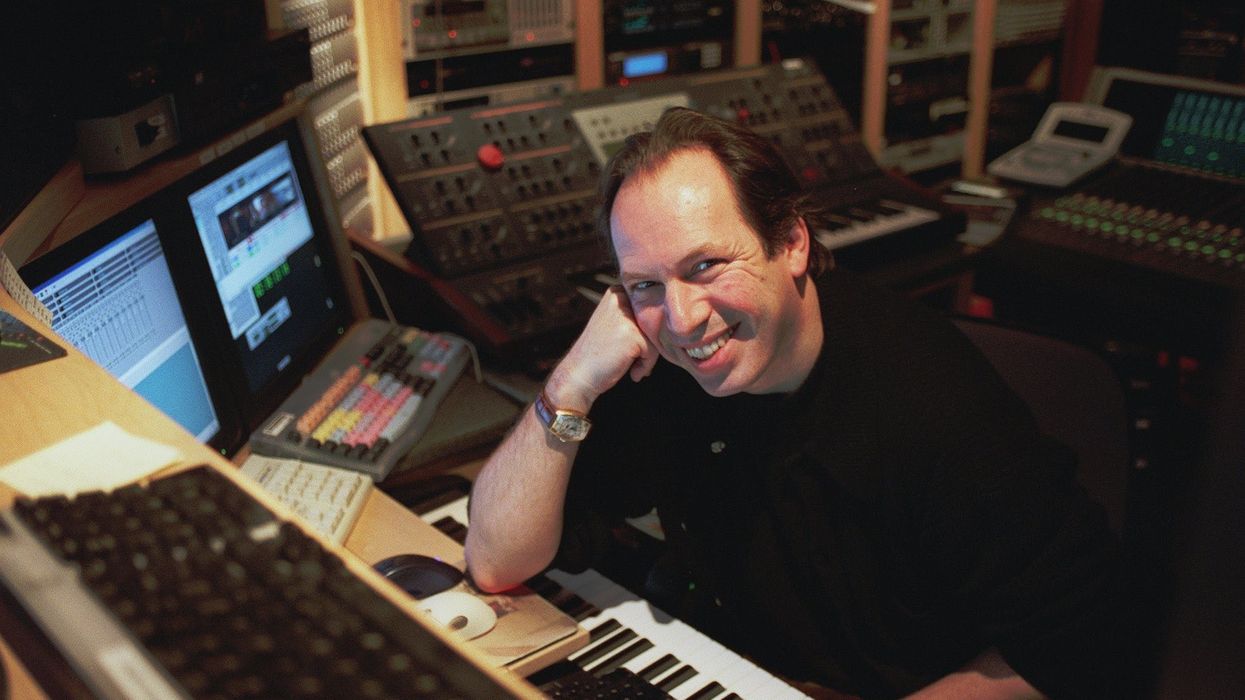Hans Zimmer on How to Be a Composer with 'No Technique and No Formal Education'
Hans Zimmer, the legendary Academy-Award winning composer of over 150 films, breaks down his most famous work.

[Editor's Note: Although it may appear that the same video is being featured several times throughout this article, we've actually set each specific one to the timecode of when Zimmer brings up an example of a particular movie. While the video's thumbnail may appear the same for each, click play and you will be taken to a specific portion of the lengthy conversation].
During the course of Hans Zimmer's career, the German-born composer has worked with directors from Christopher Nolan to Terrence Malick, and composed scores in every conceivable genre, from animated films (The Lion King, for which he won an Oscar for Best Original Score) to action movies (Crimson Tide) and blockbusters like The Dark Knight trilogy.
Earlier this month, during a talk presented by BAFTA at the Royal Albert Hall in London, Zimmer sat down with Tommy Pearson to look at clips from some of his most famous films and share some insights from his four decades in film.
Rain Man
Zimmer's breakthrough came with 1988's Rain Man, directed by Barry Levinson. For the film, which follows two brothers (Tom Cruise and Dustin Hoffman) on a cross-country trip, "We made a list of what not to do, because it's a road movie, and road movies in those days were either jangly guitars or sweeping strings."
In order to capture the spirit of the film, Zimmer looked to Hoffman's character, an autistic savant: "The character was so disoriented in the world that basically the music could be just this mash-up of crazy Cuban rhythms with you know, whatever...it's foreign, foreign was good, and I can get really foreign."
Zimmer recalled that "Since I didn't know anybody in Los Angeles, this was all written in Barry Levinson's office, and so there was a cutting room and there was my room," with the majority of the score written on a Fairlight, the world's first sampling synthesizer (introduced in 1980) and one of the most expensive ever made (the machine's sound can be heard on many classic films of the era, including Blade Runner.)
Zimmer had a very collaborative relationship with Levinson, and, regarding the scene above, said that "it's not so much that it's cut to the music, but obviously the scene shaped the music and the music shaped the scene."
He also revealed his surprise at the state of scoring in Hollywood, compared to Europe, where he had previously been working in commercials. "It [Hollywood] was antiquated...the whole idea that you had to write it on paper, give it to the orchestra, then the first time the director would hear it would be with the full orchestra and he'd go, 'I don't really like this' and everyone would go crazy because you'd sent the orchestra home...Everything was a compromise and, at the same time, a heart attack."
Gladiator
Zimmer's work on Ridley Scott's Gladiator marked their second collaboration, the first being Crimson Tide, though as Tommy Pearson pointed out, in the five years between the two films, technology in Hollywood had greatly advanced. The film was cut in Zimmer's studio, "which made it very collaborative," particularly when working with the film's editor, Pietro Scalia. "Every time the cut changed," he said, "Pietro would very kindly cut in four bar chunks, so I could go and figure it out."
When Pearson remarked that this must have been great for Zimmer, because this sort of situation isn't always the case, Zimmer responded, "That's how it's supposed to work. It's supposed to be collaborative."
Zimmer said that, as a composer, not having a formal background in music helped him because, "I'm never going to fall prey to using words that are incomprehensible to a director, like 'allegro'....It's about the story, and you know, how do we tell the story."
He also discussed an early conversation he had with Scott and editor Pietro Scalia regarding the tone of the film, which, being set in the world of Ancient Roman gladiators, had, in Zimmer's words, "No female soul in it." After listening to a CD of the "singular" vocalist Lisa Gerard, which Scalia happened to have on his desk, Zimmer decided to incorporate her voice into the score. "They were literally in my room...Ridley smoking cigars, [and I'm] going, 'He's going to ruin her voice,' Lisa with a microphone and the picture up, just trying things."
Inception
Zimmer recalled that his work on the mind-bending Inception began with a holiday he took with writer/director Christopher Nolan and their families: "We're sitting on the beach watching our kids and he's going, 'I've got this idea for a movie,' and I realized as he's telling me the idea, this might be intellectually somewhat tricky for an audience to follow." This initial reaction carried over to the way Zimmer approached the music. "I tried to write music that was, in a funny way, reassuring to the audience...The music was like a river and you're on this little boat, and sometimes it gets a bit bumpy, but you're on a journey and you're going to get to the end."
"You don't want be to be tied to the mechanics of things, and you don't want your imagination to be tied down either."
The use of Edith Piaf's song “Non, je ne Regrette Rien” in the film is pivotal (and somewhat ironic, considering that the film features Marion Cotillard, who had, of course, won an Academy Award for portraying the French singer). In the film, the song is used to remind the characters that they're dreaming, though it also features into the film's most famous musical cue, in a dramatically slowed down version (though it wasn't until a video went up on YouTube that this became apparent.)
"We were trying to make a story point and we had failed, because nobody got it until this guy on YouTube." Zimmer revealed that the score for Inception was written "parallel to the movie, it wasn't actually written to the movie," meaning he worked on the score while Nolan was shooting the film.
Zimmer also spoke about his decision to include the work of Smiths' guitarist Johnny Marr, an unusual decision for Zimmer because, he said, "the worst thing in film music [is] electric guitars and orchestra. It's absolutely awful." But, having heard the guitarist in his head for days, he called Nolan and pitched the idea as not electric guitars with an orchestra, but Marr specifically, which Nolan liked, and Marr's contribution ended up being an indelible part of the film.
Interstellar
Another collaboration with Christopher Nolan, 2014's Interstellar, was marked by their unusual style of working together. Just like the score for Inception was marked by a conversation the two had on a beach, Interstellar's score began with a typewritten letter to Zimmer that Nolan wrote, explaining the film's ideas in a very personal way.
"The film is about the relationship between a father and his daughter, and he was writing to me about my relationship with my son," Zimmer reflected. Being a self-taught musician, with no formal training, Zimmer said that everything he writes comes from a personal place, "and Chris knows this, and he is very crafty and taps into that."
Regarding the score's use of the pipe organ, Zimmer told of how, during their initial work on the film, the two sat down and discussed, following their work together on Inception and The Dark Knight trilogy, "what [we] hadn't done." Nolan suggested the instrument, which led to an associative connection for Zimmer between the shape of the pipes and "the rockets themselves, which I thought was incredibly appropriate." He said he worried a little about the connotation of an organ with bad horror films, but felt it would be an "interesting challenge" to use the instrument and see if they could, in his words, "sort of increase the vocabulary a little bit."
"I have no technique and I have no formal education, so the only thing I know how to write about is something that's inside of me."
As with the previous collaborations, the music was written apart from the film and then "crafted to fit the film," because Nolan doesn't work in the traditional way of cutting a film to music. "You don't want be to be tied to the mechanics of things, and you don't want your imagination to be tied down either." He spoke of his relationship with editor Lee Smith, with whom he had worked with on all of Nolan's films, and who had a background in sound. "It's not just that we discuss music, but he has a rhythm...there's a musical form of editing."
Zimmer said that the music in the clip was written as an independent piece and that he wasn't entirely sure it would work until Smith laid it on top of the picture, and "it just did everything it was supposed to do. It never changed." Pearson revealed that the film's live performance, at the Royal Albert Hall, had been one of the "loudest things that ever happened in that room, and that includes Led Zeppelin in 1970."
Hans Zimmer's career has been marked by an unorthodox approach to music and film scoring and part of this lies, he thinks, in his lack of formal training. "I have no technique and I have no formal education, so the only thing I know how to write about is something that's inside of me."
Another recurring theme in his career is one of collaboration, both with filmmakers as well as individual musicians. "It's individuals that make up that section, and you want to go and pick your individual players because they literally bring something to the party. They are our collaborators, they are our family, it's why we're loyal to them, because they've been loyal to us."
Source: BAFTA Guru












